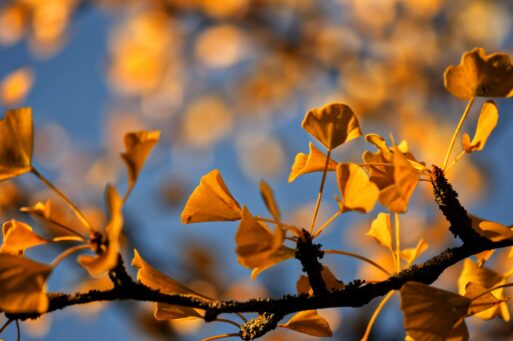
Credit: Felice Wölke
Outside my window is a gold, gold tree.
Its leaves are not ombré. They are solid
gold. Like a kid might color in a sun with yellow crayon.
The tree glows like a holy pyre, a fluttering liturgical
candle.
Set against the opal sky, wavering. Burning.
A flame I could warm my hands on.
*
Last autumn, my family packed up their pets
and fled from the fire that licked down the trees.
My mother did not have time to grab her cell phone. They
packed up their pets
and left. This was after my brother
went downstairs to get a drink and the hillside of
blackberries
was knocking at the window in flames.
Almost close enough to touch.
They drove through the night. One cat. Two dogs. Four people.
Driving for their lives.
*
The tree out my window is not a ginkgo tree, but I like to
pretend that it is.
Ginkgo trees, too, produce such light. Their mermaid-tail
leaves brighter than honey.
Before he died, my grandfather loved ginkgo trees. He
said they dated back
to the dinosaurs and he admired that resolve.
Survival for so, so long.
I wish I could interview the Ginkgo biloba, ask it
what it has seen.
Meteors and Ice Age. Empires and ruin. A
tidal waltz of life.
If I could, I would ask it, What do we do?
You’ve seen it all. What do we do?
*
The news says some firefighters rescued a mountain lion
cub
who was wandering alone amid the char. He was
orphaned, see.
They named him Captain Cal. Nurses treated his burns.
In videos online, you can look
into the Captain’s eyes.
Imagine what he has seen.
*
My family takes a video of what the fire did to
their next door neighbor’s siding.
A scorch mark slashes its way across the house. A hot knife
dragging its ire.
It tastes like smoke, they tell me once they are back home.
Inside the house. The air,
it tastes like smoke.
*
I have never wanted to believe more in charms, in
prayers, in blessings.
My mother’s friend says the small row of stones that
is blessed
helped protect them from the fire. I do not know how
or why the stones are blessed. Or who blessed them.
But I want it to be true.
*
My grandfather had this tree in his back yard. A
ginkgo. By a hillside
full of nightshade. Whenever we’d play blackjack, he’d
gesture to its gold leaves, say,
Think of that, Cat. Think of all it has survived. It must
know something rare. Something special.
I’d nod and crunch a pretzel. Study my hand. The cards
adding up
to seventeen. At twenty-one or higher, you lose.
Hit me, I’d say.
Pushing my luck. Hoping to beat the odds.
In “Torch,” poet Catherine Broadwall explores the fire-related loss that increasingly ravages North America. Broadwall’s characters are able to escape the flames with their family members and pets, but barely – fire tapping at the windows; a cell phone left behind. As the poem continues, Broadwall hints at further consequences: an orphaned mountain lion cub, houses branded with scorch marks, air that tastes like smoke.

Poet Catherine Broadwall
Credit: catherinebroadwall.com
While these grievances may seem minor compared to the thousands who’ve lost homes or loved ones, Broadwall presents them as heart-wrenching evidence of the widespread devastation resulting from climate change. She turns to her elders – her grandfather, before he died, and his reverence for Ginkgo trees; their ability to survive dramatic changes – and asks: What do we do?
As the U.S. and Canada move into a warm, dry spring, and a potentially exceptional fire season, there is no easy answer to Broadwall’s question. Only the desperate grasp for optimism in the poem’s final lines: “Pushing my luck. Hoping to beat the odds.”
“Torch” appeared in Broadwall’s 2023 collection “Fulgurite,” named for the glassy crust formed when lightning strikes sand or rock. You can view more of her work on her website, catherinebroadwall.com.

 “Torch” by Catherine Broadwall
“Torch” by Catherine Broadwall


 Recovering Cremation Remains After the Los Angeles Fires
Recovering Cremation Remains After the Los Angeles Fires
 “As Tears Go By” by Marianne Faithfull
“As Tears Go By” by Marianne Faithfull
 “The Sea” by John Banville
“The Sea” by John Banville














